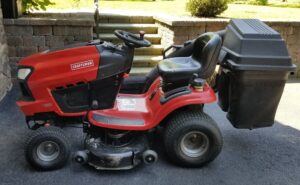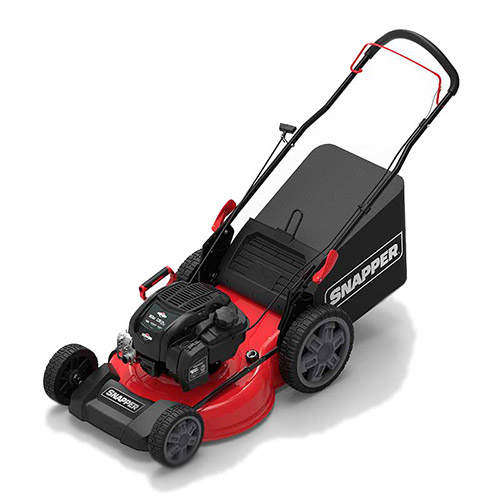 Lawn mowers are typically loud. Some considerably more so than others. We all know this to be true. But, how loud is too loud? Why are they so loud and what can anyone do to mitigate the discomfort and potential damage that can be done?
Lawn mowers are typically loud. Some considerably more so than others. We all know this to be true. But, how loud is too loud? Why are they so loud and what can anyone do to mitigate the discomfort and potential damage that can be done?
Most lawn mowers produce around 85 to 90 decibels (dBA) with some at up to 110 decibels (dBA). Exposure to such a high decibel level over extended periods can be damaging to the human ear.
According to their website, OSHA (Occupational Safety and Health Administration), says when “noise exposure is at or above 85 decibels (dBA) averaged over 8 working hours, or an 8-hour time-weighted average (TWA)” a company must provide for their employees a Hearing Conservation Plan.
“Approximately 15% of American adults (37.5 million) aged 18 and over report some trouble hearing”
The National Institute on Deafness and Other Communication Disorders (NIDCD)
Should I be wearing special gear to protect my hearing while mowing my lawn?
According to the Lawn Institute (www.TheLawnInstitute.org), the average lawn takes 30 minutes to mow. Over the course of a year, the average person regularly mowing their lawn would have exposed themself to 11 hours of mowing time at 85dBA – 90dBA. This being said, and with the above OSHA mandate information taken into account, these persons should be wearing protective noise canceling gear to reduce their exposure.
Why are Lawn Mowers so Loud?
Lawn mowers are driven by internal combustion engines. Within every internal combustion engine, small explosions are happening whose force is used to drive the engine; giving the lawn mower power. Cars work the same way (at least most of them). However, cars have complex exhaust systems which include mufflers with which to dampen and quiet the vehicle’s noise output. Mufflers are made to dampen or absorb the acoustic vibrations created by the engine on our mowers. It would seem sensible that these mufflers could be made to be more effective as they would be on a car. However, after researching the topic I’ve found that the most logical reason is that manufacturing a mower that has a better muffler would be more costly, which could well price that manufacturer’s product out of competition in the marketplace.
It would seem to me, if no one else, that a more quiet mower would be something of an upsell or a positive marketing point, as it would be with a car, for example; that a product would accentuate the quiet muffler as an incentive.
“A typical gas-powered mower is 85 to 90 decibels for the operator (90-95 for riding lawnmowers). In a typical suburb, it can be heard a quarter mile away or more. Mowing a quarter-acre lot pollutes 100 acres of a neighborhood with noise. And while the neighbors complain, the operator is slowly going deaf.”
the Noise Pollution Clearinghouse, a national non-profit organization seeking to raise awareness about noise pollution:
On the other hand, though, lawn mowers are inherently dangerous. The damage that can be done to bystanders or household pets could be devastating. Therefore, the loud noise does, indeed, serve as a constant warning to stand clear of the machine while it is running.
What Can Be Done to Mitigate the Potential Noise Damage to My Hearing While I Mow My Lawn?
There are a few things you can do:
- Check your muffler: If your mower is on the older side, the muffler may be worn out. If so, its capacity to absorb the noise coming from the mower will be greatly diminished. However, even if you have a newer mower, there are opportunities to acquire and install a more quiet model. I have listed some recommendations for the most popular models of mowers and lawn tractors on the neohandyman recommendations page. Check it out…
- Check your oil: Old oil in your mower is the absolute worst thing that you allow to happen. It will cause your engine to run poorly, burn your cylinders, and potentially cause knocking in your engine. If your sparkplugs are fouled, they may misfire and cause a loud backfire. If you are hearing a knocking sound or backfiring, it is suggested that you check your owner’s manual for the proper oil, oil filter, fuel filter, and sparkplug(s) and replace them as soon as possible.
- Acquire a set of noise-canceling headphones: While your mower may be putting out the noise that is under the OSHA guideline, it may still be uncomfortably loud. It may be in your best interest to consider noise-canceling headphones. There are many different models to choose from these days. And, most are very effective even at the lower price points.
- Buy a more quiet mower: This choice is certainly falling under the category of more easily said than done for most. The measures mentioned above are certainly the more immediately economical choices. But if you find yourself at this point, there are some fine choices for both gas-powered and electric mowers as well…
What Are The Most Quiet Lawn Mower Models Available?
The two most quiet – gas powered – lawn mowers on the market today are:
The Craftsman Model # 37545 Gas-Self Propelled as shown by Consumer Reports only outputs 79dBA. By OSHA standards, you could safely operate this mower without hearing protection.

Snapper 21725Q 21″ also with the Briggs & Stratton Single Speed RWD Self-Propelled Lawn Mower with Quiet Power Technology®(QPT®) uses the same engine as the Craftsman shown above, also at 79dBA. Both of these mowers have a Briggs and Stratton QPT engine, their most quiet engine to date.
There is, however, one drawback to both of these quiet mowers. According to Consumer’s Reports (see video above): They do possess slightly less power than their less quiet counterparts. This is to say that these mowers when used on excessively tall grass, especially when damp, may not be as effective. If you find, however, that quiet performance is important enough to you, then this situation is easily overcome by taking the extra time to make some of the passes across your lawn at a reduced width. Also, while it will sound elementary, increasing the frequency of mowing will allow you to mow while the grass is shorter.
Electric Mowers: How Quiet Are They?
There are some very good electric and battery-powered lawn mowers on the market. They are considerably more quiet than their gas-powered counterparts. So much so that finding a noise rating on most of them is almost negligible.
NeoHandyMan – Recommended
Battery Powered Electric Mowers:
The two battery-powered, electric mowers shown here are the best on the market today.
Brand: DeWalt
As a contractor I can tell you that the industry standard on virtually every tool there is available is DeWalt. I was taught as a young man that I shouldn’t ever be afraid to spend more for the best. That is because, in the long run, you will have spent less as the best will last you a good long time. For me “DeWalt is the Default”. If I need a tool and DeWalt offers one, I am done shopping.
On this mower, one of the best attributes is that there is more than one battery that can be paired with the mower allowing for more power and extended runtime…

Brand: EGO
The EGO Power Lithium-ion Battery Powered Mower is an exceptional value. This mower is a lightweight, rear bagging powerhouse that folds up nicely for storage and has a 55-minute battery runtime.
I will list the details of both of these recommended mowers in the Recommendations section of this website.
How would I know If My Lawn Mower is Creating a Dangerously Loud Environment?
The National Institute for Occupational Safety and Health (NIOSH) Sound Level Meter App is one tool available to the public to download on mobile iOS devices that measure sound levels in the workplace and provide noise exposure parameters to help reduce occupational noise-induced hearing loss.
I, myself, have downloaded a free app called “Sound Meter” from Google Playstore. It is fully and easily calibrateable by you. This does leave a certain amount of relativity in the equation. But, it will give you a fair idea of just how loud your mower of choice can be…
Using the app suggested above, I did the noise level experiment on my tractor. Give it a look…
I hope this article was helpful.
Best of luck with your searching.
Berk

